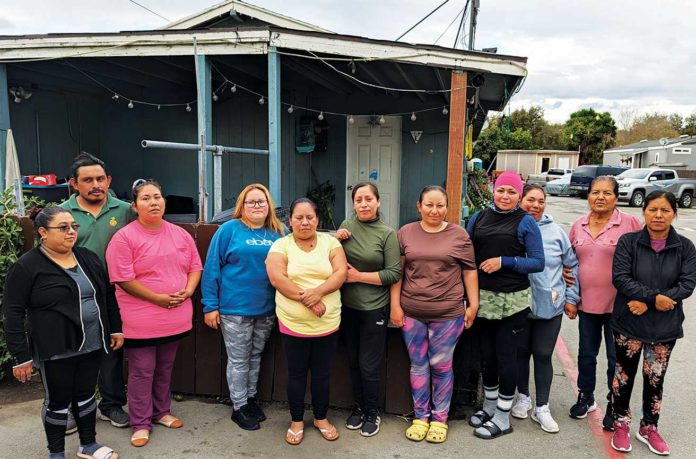In the middle of the holiday season, 14 families that live on 29 San Juan Road in Pajaro must find somewhere new to live in one of the country’s most expensive rental markets.
On a rainy day in November, the concerned faces of adults are juxtaposed against the laughter of playing children as many families are only days away from vacating their homes—homes that some have rented for almost 20 years.
This is the end result of a months-long process that began when a concerned tenant contacted Monterey County officials about unsafe conditions in their dwelling. Instead of working with the county to bring the property into compliance, the landlord gave a 60-day notice of eviction to all tenants.
The situation highlights the consequences some renters face when addressing unsafe living conditions. Even if landlords act in good faith to fix problems, the high cost of administrative fees for code violations may force them to cut their losses and evict long-term tenants.
Residents reached out to local organizations in hopes of getting assistance to relocate, and Community Bridges has stepped in to help. After starting a GoFundMe for those affected earlier this month, it has raised more than $63,000 with the help of the Community Foundation of Monterey County and individual donors. Community Bridges is a Watsonville-based nonprofit that helps with food and healthcare access throughout Santa Cruz County.
For these families, time is running out, and they have to leave by Dec. 17. While some have already secured housing and are moving out, many don’t know where they’ll go.
One of the tenants, a local farmworker who requested to remain anonymous, said that he was moving out in just a few days’ time. He and his family had not yet had a place to go.
“After next week, we don’t know what’s going to happen. Our future is uncertain,” he said.
Upcoming legal battle
On Sept. 21, Monterey County Code Enforcement Inspector Lucy Bernal inspected the unit where the tenant that filed the initial complaint resided (Unit P). The inspector deemed the dwelling “unsafe to occupy” and called for it to be vacated immediately. The landlord, Rose Rentals LLC, was notified by the county that they were required to provide monetary relocation assistance to the tenants of Unit P, according to county codes.
On Sept. 26, upon further inspection of the property, Bernal reportedly found that the entire complex was out of compliance with county regulations. Five buildings in the complex were found to be in violation of health and safety codes. Violations included the subdividing of multiple properties into duplexes and fourplexes without permits; inadequate ventilation; roach infestation and no smoke and carbon monoxide alarms in three units.
Rose Rentals was given until Oct. 26 to address the violations before the county would begin citing the landlord. The initial administrative cost as of the Sept. 26 notice was $900. But according to Monterey County communications director Nicholas Pasculli, the county was willing to be flexible with the enforcement time frame as long as Rose Rentals was “making an effort.”
However, the landlord on Oct. 18 issued a 60-day eviction notice to all 17 units to redevelop the property for non-residential use. In a statement through its attorney Bryan K. Williams, Rose Rentals said after “exhaustive” talks with the county, the “only pathway forward for the property at 29 San Juan Road is a redevelopment that does not include residential housing.”
Pasculli said that this determination was not made by the county and that there were options available to keep residents in their homes.
“The landlord has the option of keeping the residents and maintaining the units within legal provisions, and while applying for permits in compliance with the current zoning,” Pasculli said in an email.
Tanya Ridino, executive director of Senior Legal Services, is the attorney representing the tenants who are being evicted. Senior Legal Services offers free legal aid to tenants and landlords.
Ridino said the legal grounds of the eviction process is what she will be arguing in court, but that the interpretation of whether or not it was retaliatory or legal will ultimately be determined by the court.
Ridino asserts that the landlord does not need to evict the remaining tenants: the county red-tagged one unit, but the remaining units simply needed repairs and permits for the landlord to continue to rent them to tenants.
“Yes, the landlord didn’t fix the repairs as he should have, perhaps he was charging more than fair market value given the condition of the homes. But by and large, you know, the families were happy to be housed,” Ridino said.
Ridino said that ultimately, the tenants and her organization wanted to find a win-win with the landlord, even offering to help fund the repairs or aid with the permitting process.
“The landlord does not have to evict everybody and he’s claiming that he does,” Ridino said.
Bigger picture
Ridino says that while the scale of the eviction in San Juan Road—and the timing of being during the holiday season—makes this situation devastating, the unfolding of the events leading up to eviction is not uncommon.
“It’s just a total imbalance of power between landlords and tenants,” Ridino said.
This is attributed to a few factors. The housing market in Santa Cruz and Monterey counties is competitive, both in rental prices and available units—this imbalance in demand and supply can make tenants hesitant to even bring issues forward.
Ray Cancino, CEO of Community Bridges, says this fear was a hurdle for the tenants of San Juan Road.
“The majority of folks were very hesitant to get a lawyer to basically do eviction prevention work,” Cancino said. “The majority of them didn’t want to trigger making the landlord upset or do anything to create a negative relationship.”
He also said tenants are facing unreasonable—and sometimes illegal—requests when applying for new housing.
“We have landlords asking about citizenship status, obviously a lot of these folks have limited credit because they’re recent immigrants,” Cancino said. “I think the biggest issue has been just the amount of fees: people are illegally charging first and last month’s and deposit.”
Meanwhile, tenants often don’t understand their rights and don’t have the resources to seek legal counsel.
“There’s so many times when somebody is not there to fight for tenants,” Ridino said. “People get bulldozed all the time.”
She says the most vulnerable in these situations are people who must overcome other hurdles: for example, not being a native English speaker, being an immigrant unfamiliar with the legal system, or being undocumented.
And then, there is also the legal system itself: there are many loopholes, Ridino says, that often make it challenging to prove when an eviction is retaliatory beyond a reasonable doubt. And, she says, landlords have many options for recourse when it comes to evicting people.
“Tenants do have rights, and it is not too difficult for the landlords to say, ‘All right, then I’m gonna you know, I’m going to take it off the market, you know, I’m going to do a substantial remodel, which is going to require you moving out,’” Ridino said.
And, there’s the sentiment of the court and the judge to consider.
“You can’t fully rely on the court to follow the letter of the law, sadly it’s a bit of a gamble, anytime you go into the courtroom,” Ridino said. “It’s pretty landlord friendly in our county.”
According to Ridino, one way to tip the balance of power in these situations is through organizations like the one she works for and mediation services like Conflict Resolution Center that help people understand their rights and collaborate with their landlord. She also hopes that the Santa Cruz County Courthouse will implement day-of court mediation services, which focuses on mediation between tenants and landlords to keep conflicts from going to trial.
But Cancino and Ridino agree that equal representation and counsel for all is the ultimate equalizer.
“I don’t think that that’s the American dream, where you win only when you get represented,” Cancino said. “And if you have no one to represent you, you’re usually at the losing end of any deal.”












